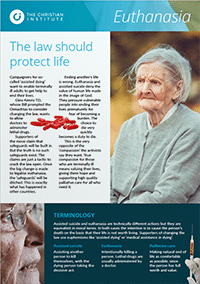Doctors in Glasgow have injected stem cells developed from an aborted baby into the brain of an elderly stroke patient, in the world’s first stem cell trial for stroke patients.
Pro-life groups have denounced the controversial trial as “unethical in every way” because it flows from the destruction of human life.
The experiment, which hopes to discover a way of prompting the brain to recover from damage caused by strokes, involves injecting millions of stem cells taken from the brain of an aborted baby.
Unethical
If this initial transplant seems safe, other patients are expected to receive progressively higher doses over the next year.
Despite similar trials being refused permission by regulators overseas, UK scientists were given the go-ahead last January.
Comment on Reproductive Ethics (CORE), a pro-life campaign group, hit out at the trial saying: “We share the dream of seeking cures for strokes, spinal injury, cancers and all the other conditions which beset modern man, but the realisation of that dream cannot depend on the taking of life of other human beings, no matter how early in development those tiny lives may be.”
Destruction
Professor Keith Muir, a neuroscientist from Glasgow University, who is leading the Pilot Investigation of Stem Cells in Stroke (PISCES) study, said: “We are pleased that the first patient in the PISCES trial has undergone surgery successfully.”
He added: “In this trial we are seeking to establish the safety and feasibility of stem cell implantation, which will require careful follow-up of the patients who take part.
“We hope that in future it will lead on to larger studies to determine the effects of stem cells on the disabilities that result from stroke.”
Embryonic stem cell research involves the destruction of human embryos and has proved highly contentious around the world.
Non-embryonic
But adult stem cell research does not involve the destruction of human embryos and has so far led to over 100 treatments or clinical trials.
In March this year a ten-year-old boy had his windpipe rebuilt using his own stem cells.
The surgery, which led the boy to be able to breathe better than he had been able to for years, was also exciting as it showed how quickly advances in stem cell technology are being made.
Advances
Only two years ago a woman in Spain had a new windpipe grown from non-embryonic stem cells, but this was at a cost of millions of pounds.
But Professor Martin Birchall, head of translational regenerative medicine at University College London, said the ten-year-old’s operation cost “about £10,000″.


